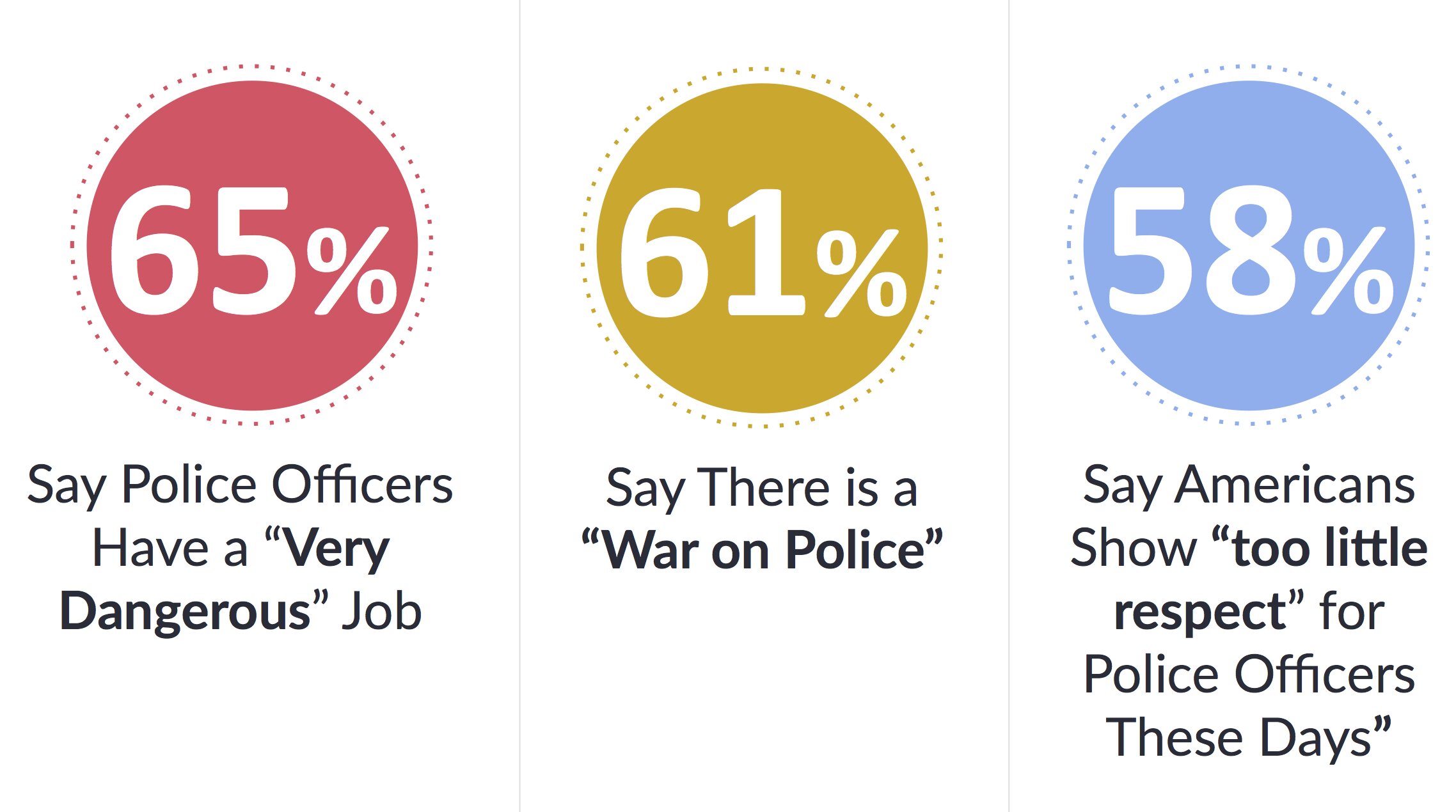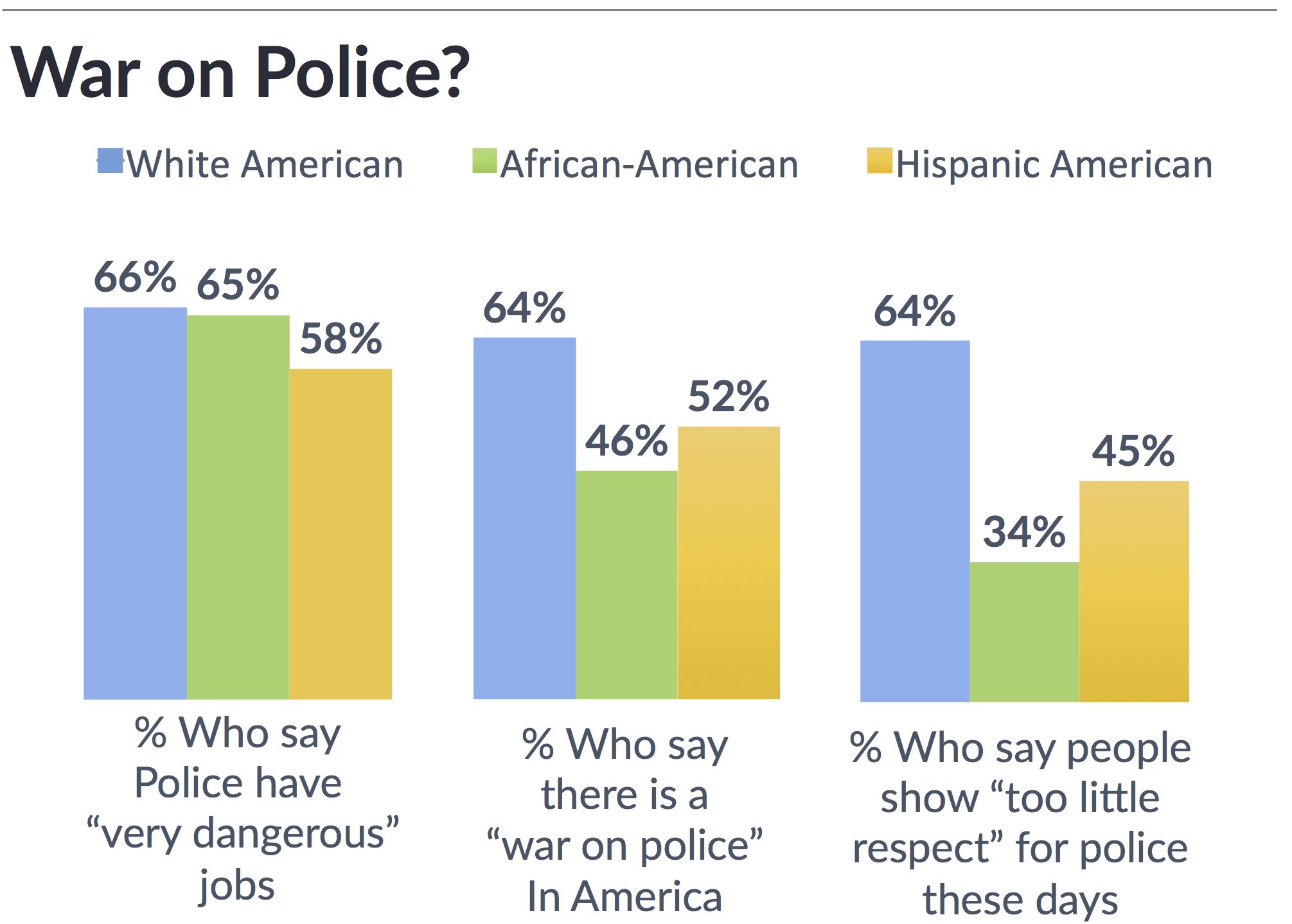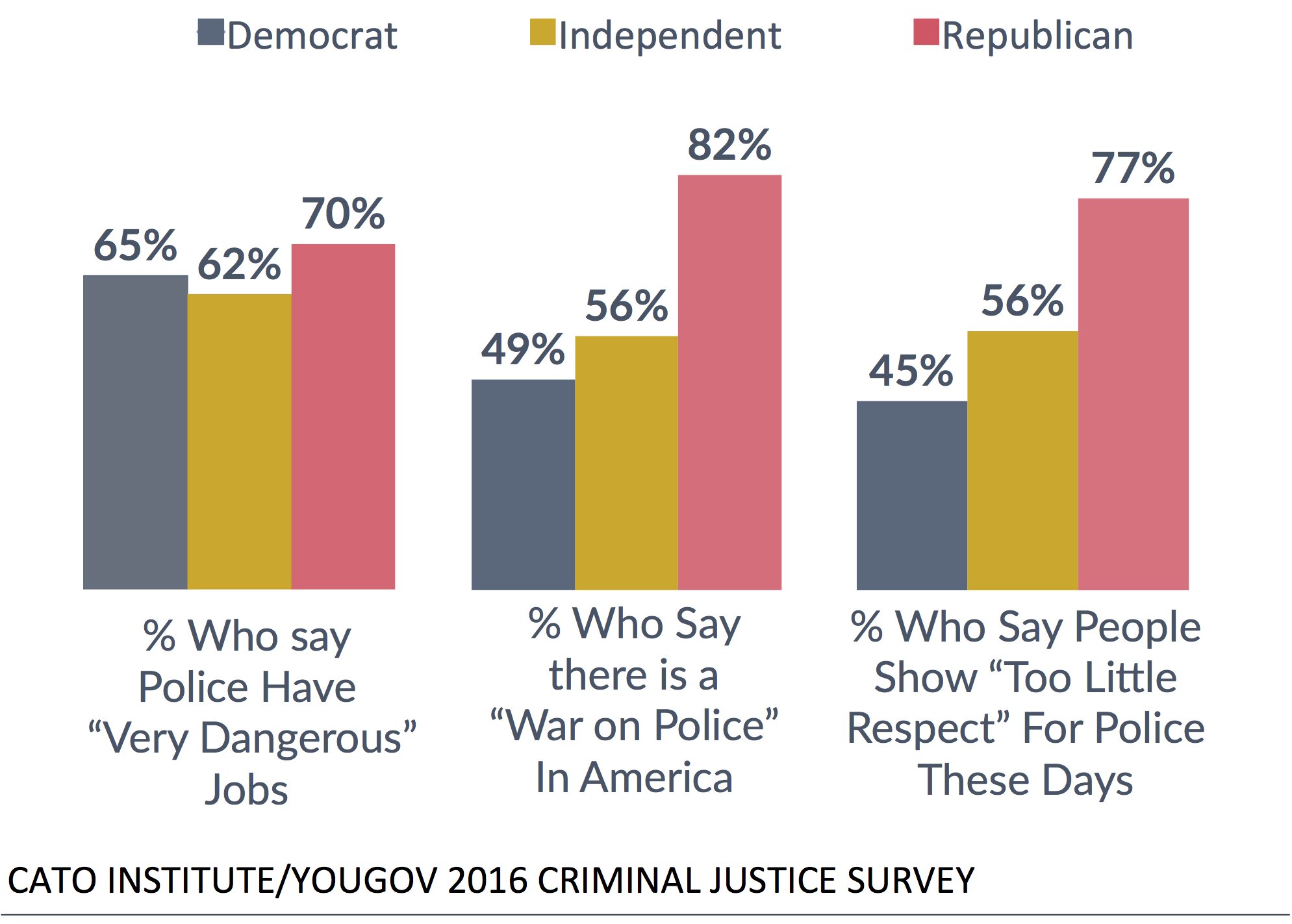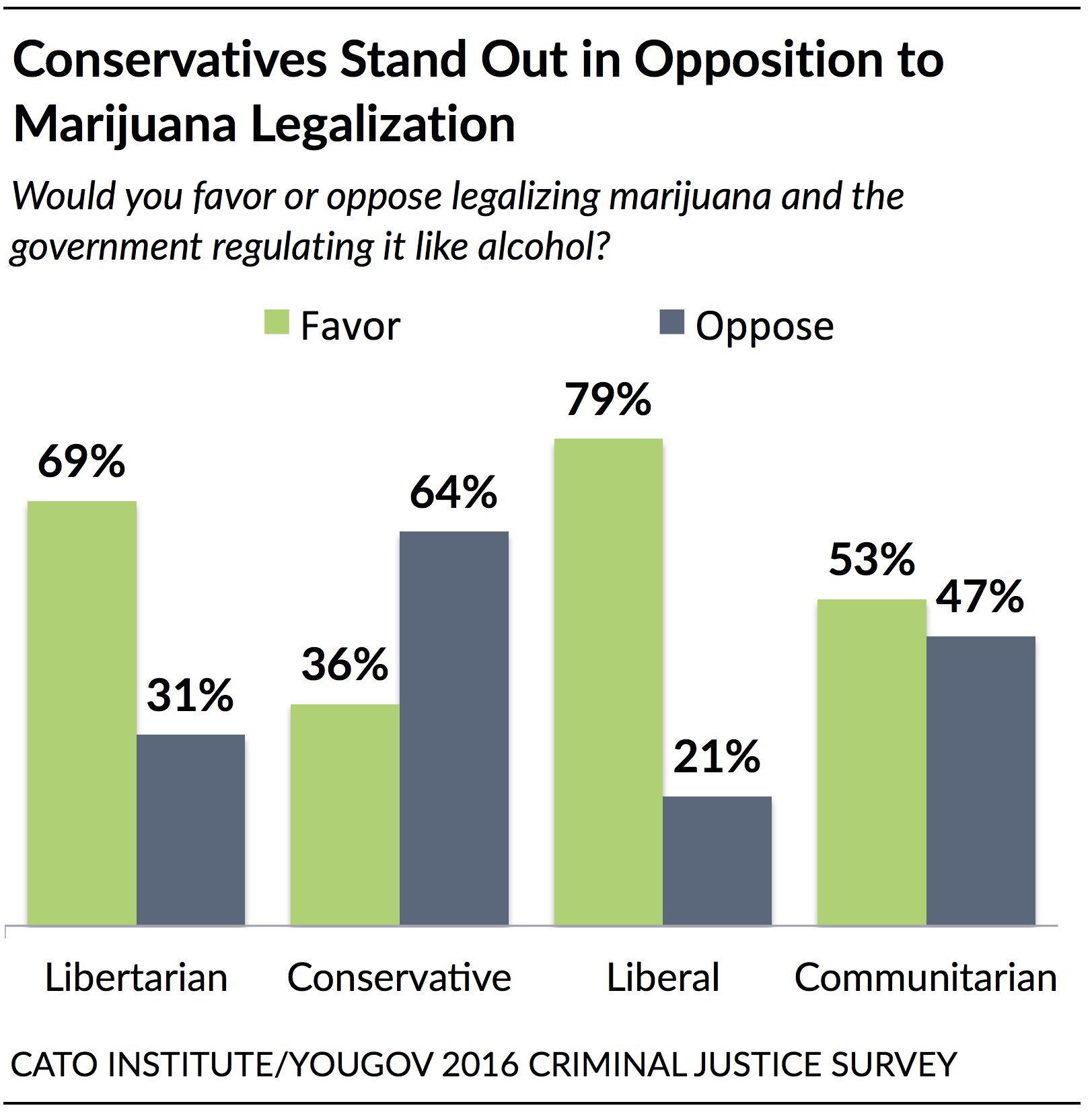This report has examined public support for reforms police departments could implement in efforts to improve relations with their communities. However, some Americans believe that their fellow citizens, not the police, are primarily responsible for strained relations. They believe too few people show adequate respect for the law and the law's enforcers and thus citizens should improve their behavior first. For instance, one online commenter wrote:
"I wonder how many deaths or injuries by law enforcement would have been prevented if the person would have shown respect to the officer, obeyed the directions, and didn't try to resist arrest or flee. We need to better support our officers and not try to defend the criminals who get by with all of the above."
Two-thirds (65%) of respondents say police officers have "very dangerous" jobs, 30% say police jobs are "somewhat dangerous" and only 5% say their jobs are not very dangerous. 103 In addition, most Americans (58%) believe their fellow citizens show "too little respect" for the police these days. Only a third think people show sufficient respect. Many Americans also don't perceive systemic problems in policing. Americans give high marks to local law enforcement for enforcing the law (59%), using the appropriate amount of force (58%), being courteous (57%), being honest (57%), protecting people from violent crime (56%), treating all racial groups equally (56%), responding quickly to a call for help (56%), and caring about their community (55%). Furthermore, 54% believe officers are generally held accountable for misconduct when it occurs. (See Appendix B for a full breakdown.)
If people a) believe police are in a dangerous line of work, b) believe citizens disrespect the police, and c) do not perceive systemic problems in law enforcement—it becomes less surprising that 61% of Americans think there is a "war on police" today.
What does the public think a "war on police" means? The term "war" can mean "a state of open, armed, often prolonged conflict carried on between nations, states, or parties." Police and citizens do have violent interactions; some have latterly become public controversies. But "war" also means "a condition of active antagonism or contention."104 There is reason to believe that most Americans think the "war on police" is largely the latter given that those who argue of its existence say it's a rhetorical war. For instance, Heather MacDonald argues in her recent book The War on Cops that the war is due to"virulent anti-cop rhetoric" [emphasis added]. 105 Furthermore police fatalities are lower today than in the past. 106
Although people across racial and partisan groups believe the police have dangerous jobs, they disagree about whether police are disrespected or are under attack.
White Americans are 20-30 points more likely than African Americans to say people aren't showing enough respect for police (64% vs. 34%) and to believe there is a war on police (64% vs. 46%). Hispanics fall in between with a plurality (45%) who say police don't get adequate respect and a slim majority (52%) who believe there is a war on police. In contrast, majorities of African Americans say there is no war on police (54%) and that officers receive adequate respect (54%).
Partisanship also matters. Republicans are about 30-40 points more likely than Democrats to believe that police aren't receiving adequate deference (77% vs. 45%) and to believe the police are under attack (82% vs. 40%). Independents lean with Republicans, with 56% who believe people don't show enough respect for officers and 56% who believe there is a war on police.
Again, race matters more than partisanship. White Republicans are the most likely group to believe the police aren't receiving enough respect; they are nearly 30 points more likely than white Democrats to feel this way (81% vs. 51%). However, black Republicans are no more likely than black Democrats to agree (35% vs. 39%).107 Older Americans are also more concerned for police than younger Americans. Seniors (78%) are 33 points more likely than millennials (45%) to think the police aren't getting the respect they deserve. Seniors are also 21 points more likely than millennials to believe that a war is being waged on cops (76% vs. 55%).
Unsurprisingly, the Respect for Authority Index (RAI) is highly correlated with concern about people respecting police.108 Three-fourths (76%) of those who have a high respect for authority believe the police aren't getting the respect they deserve, compared to only 35% of those who have a low RAI score.
Our look at public opinion and the perceived "war on police" offers lessons to criminal justice reformers. Many people have had good experiences with the police and don't perceive systemic problems in policing. Such people might assume that citizens instigate conflict with the police. Some people greatly trust authority figures like the police whom they see as the ultimate linchpin of societal order. People with such experience and views of authority may see intensifying criticism of the police and impassioned calls for reform ("active antagonism and contention") as an attack on police legitimacy, and thereby, law and order.
As they seek to persuade their fellow citizens, reformers should consider the implications of this analysis. Has their audience generally had positive or negative interactions with the police? Do they have a propensity to trust authority figures? If so, reformers should present evidence that speaks directly to these experiences and assumptions. Reformers might indicate their shared commitment to helping police to promote law and order. They can then explain how their reforms will accomplish these goals and improve police safety and police-community relations.
Notes:
103 Some might find this surprising given that fatal occupational injuries are lower for police officers than a multitude of other professions, such as taxi drivers, truck drivers, and roofers. However, police are more likely to die from felonious acts than many other professions (although taxi drivers have a higher felonious fatality rate). See Bureau of Labor Statistics, "Fatal Occupational Injuries, Total Hours Worked, and Rates of Fatal Occupational Injuries by Selected Worker Characteristics, Occupations, and Industries, Civilian Workers, 2013," Census of Fatal Occupational Injuries (Washington: Department of Labor, 2013), http://www.bls.gov/iif/oshwc/cfoi/cfoi_rates_2013hb.pdf; Bureau of Labor Statistics, "Fatal Occupational Injuries by Occupation and Selected Event or Exposure, 2014," Census of Fatal Occupational Injuries (Washington: Department of Labor, 2014), http://www.bls.gov/news.release/cfoi.t03.htm.
104 American Heritage Dictionary, 2016, s.v. "war," https://ahdictionary.com/word/search.html?q=war&submit.x=0&submit.y=0.
105 Heather MacDonald, The War on Cops: How the New Attack on Law and Order Makes Everyone Less Safe (New York: Encounter Books, 2016), p. 3.
106 The American Enterprise Institute Ideas Blog; "Is There Really a ‘War on Cops'? The Data Show That 2015 Will Likely Be One of the Safest Years in History for Police," blog entry by Mark J. Perry, September 9, 2015, https://www.aei.org/publication/is-there-really-a-war-on-cops-the-data-….
107 Data for perceptions of systemic bias by race/ethnicity and partisanship come from the combined June 2016 and November 2015 national surveys (N=4000), which offer greater precision and smaller margins of error for subgroups. (Unweighted: Black Republicans=44, Hispanic Republicans=165, White Republicans=1193, Black Democrats=630, Hispanic Democrats=409, White Democrats=634.)
108 The Respect for Authority Index (RAI) is a composite scale based on averaging responses to three questions measuring people's general respect for authority, without asking explicitly about police authority. See Appendix E for question wording and further details. High Respect for Authority (RAI) scores are defined as those in the top quartile, while low RAI scores are defined as those in the bottom quartile.



